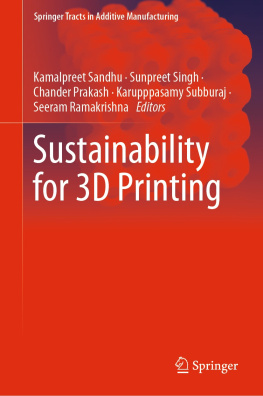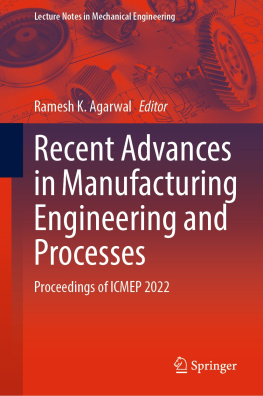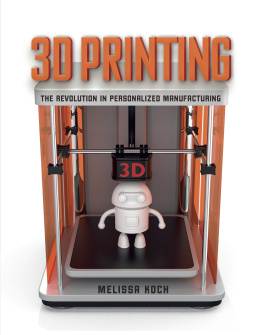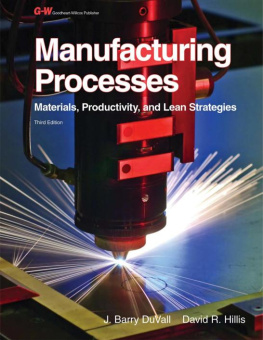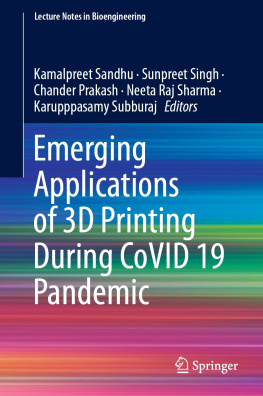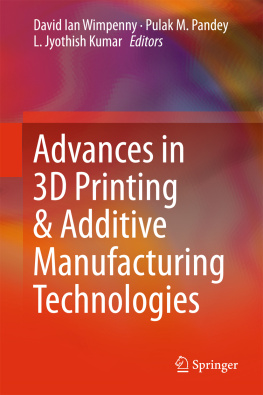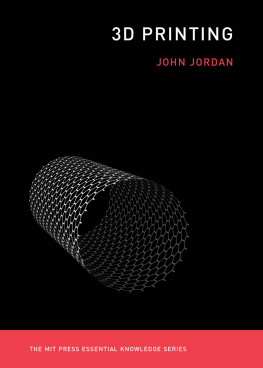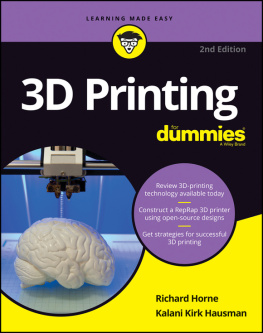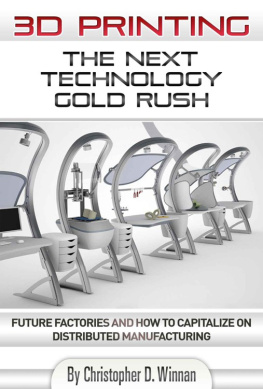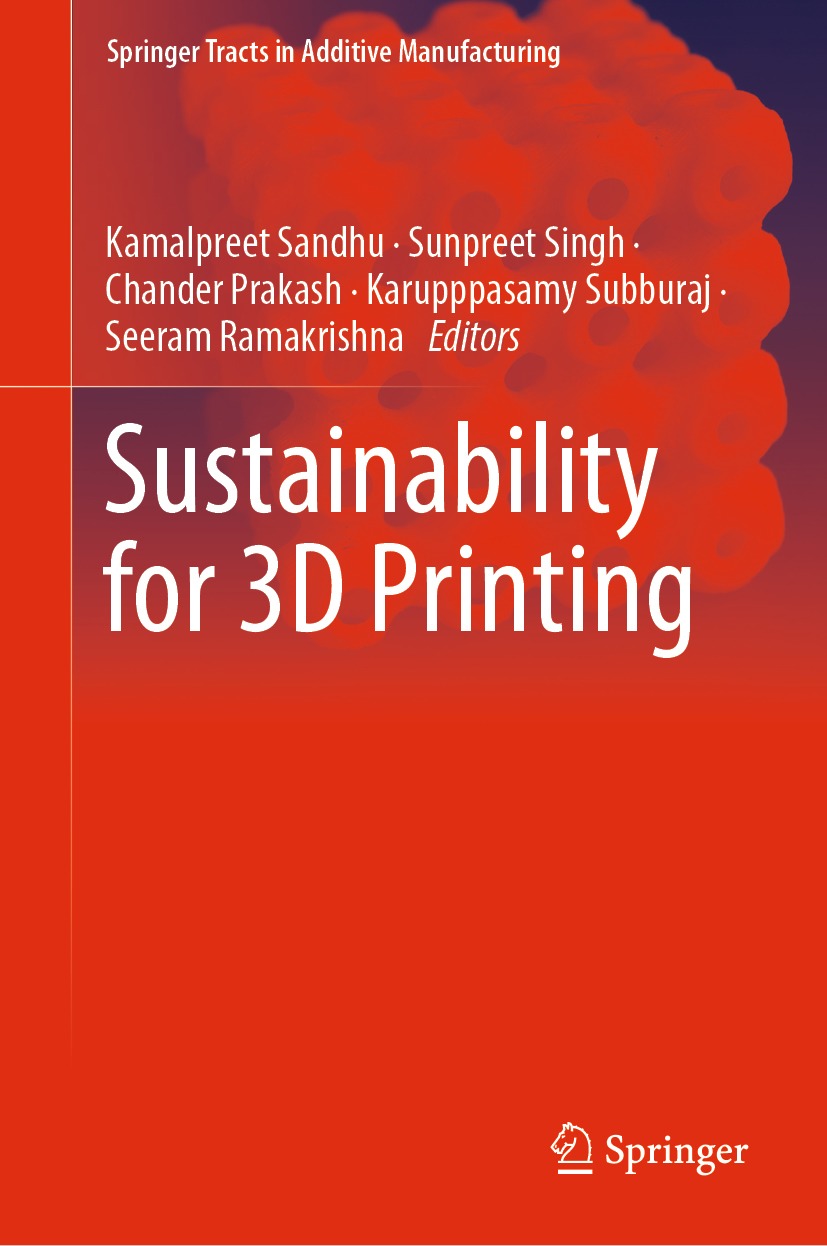Springer Tracts in Additive Manufacturing
Series Editor
Henrique de Amorim Almeida
Polytechnic Institute of Leiria, Leiria, Portugal
The book series aims to recognise the innovative nature of additive manufacturing and all its related processes and materials and applications to present current and future developments. The book series will cover a wide scope, comprising new technologies, processes, methods, materials, hardware and software systems, and applications within the field of additive manufacturing and related topics ranging from data processing (design tools, data formats, numerical simulations), materials and multi-materials, new processes or combination of processes, new testing methods for AM parts, process monitoring, standardization, combination of digital and physical fabrication technologies and direct digital fabrication.
More information about this series at http://www.springer.com/series/16694
Editors
Kamalpreet Sandhu , Sunpreet Singh , Chander Prakash , Karupppasamy Subburaj and Seeram Ramakrishna
Sustainability for 3D Printing
1st ed. 2022

Logo of the publisher
Editors
Kamalpreet Sandhu
Department of Product and Industrial Design, Lovely Professional University, Phagwara, Punjab, India
Sunpreet Singh
National University of Singapore, Singapore, Singapore
Chander Prakash
Department of Industrial Engineering, Lovely Professional University, Phagwara, Punjab, India
Karupppasamy Subburaj
Engineering Product Development, Singapore University of Technology and Design, Singapore, Singapore
Seeram Ramakrishna
Department of Mechanical Engineering, National University of Singapore, Singapore, Singapore
ISSN 2730-9576 e-ISSN 2730-9584
Springer Tracts in Additive Manufacturing
ISBN 978-3-030-75234-7 e-ISBN 978-3-030-75235-4
https://doi.org/10.1007/978-3-030-75235-4
The Editor(s) (if applicable) and The Author(s), under exclusive license to Springer Nature Switzerland AG 2022
This work is subject to copyright. All rights are solely and exclusively licensed by the Publisher, whether the whole or part of the material is concerned, specifically the rights of translation, reprinting, reuse of illustrations, recitation, broadcasting, reproduction on microfilms or in any other physical way, and transmission or information storage and retrieval, electronic adaptation, computer software, or by similar or dissimilar methodology now known or hereafter developed.
The use of general descriptive names, registered names, trademarks, service marks, etc. in this publication does not imply, even in the absence of a specific statement, that such names are exempt from the relevant protective laws and regulations and therefore free for general use.
The publisher, the authors and the editors are safe to assume that the advice and information in this book are believed to be true and accurate at the date of publication. Neither the publisher nor the authors or the editors give a warranty, expressed or implied, with respect to the material contained herein or for any errors or omissions that may have been made. The publisher remains neutral with regard to jurisdictional claims in published maps and institutional affiliations.
This Springer imprint is published by the registered company Springer Nature Switzerland AG
The registered company address is: Gewerbestrasse 11, 6330 Cham, Switzerland
Preface
The book entitled Sustainability for 3D Printing aimed to present various experimental outbreaks on the novel methodologies to treat solid waste as different types of feedstock materials, suitable for demanding design and engineering applications, of 3D printing technologies. This book provides a comprehensive knowledge of the innovative models, machine tools, and processing routes adopted for treating solid wastes and recycling/reuse of the same as different types of 3D printing feedstock. In particular, detailed discussions on the life cycle assessment, sustainability, and eco-friendliness of the developed feedstock as well as end user products also be incorporated. The editorial team has understood that number of books already published in the field of the 3D printing with different focuses; however, it is of utmost important to produce an ideal and reader friendly source of literature with Waste to Wealth focus as it have huge potential to serve as a reference source to the experts of manufacturing, materials, metallurgy, product design, waste management, and sustainability prospective. Further, it has been believed by the editorial members that every manufacturer, in todays manufacturing era, is bounded to follow the sustainability ethics to minimize the negative impact of manufacturing on environment as well as well-being of the living species. Indeed, this edited book provides wide variety of literature review, case studies, experiential studies, and technical papers to highlight the scope of using waste as wealth through 3D printing.
Kamalpreet Sandhu
Sunpreet Singh
Chander Prakash
Karupppasamy Subburaj
Seeram Ramakrishna
Phagwara, India Singapore, Singapore Phagwara, India Singapore, Singapore Singapore, Singapore
Contents
Henrique Almeida , Eujin Pei and Liliana Vitorino
Guravtar Singh , Raja Sekhar Dondapati and Lakhwinder Pal Singh
C. P. Paul , Sunil Yadav , S. K. Nayak , A. N. Jinoop and K. S. Bindra
Sagar U. Sapkal and Pritam H. Warule
Nur Banu Glle and Semra Arslan Seluk
Letcia Faria Teixeira , Juliana de Vilhena Rodrigues , Lauro Arthur Farias Paiva Cohen and Nubia Suely Silva Santos
S. N. Kumar , Roopal Jain , K. Anand and H. Ajay Kumar
Meyyappan Palaniappan
Gurcharan Singh Bhalla , Harmanpreet Singh and Puneet Bawa
Joanna Woniak , Grzegorz Budzik and ukasz Przeszowski
About the Editors
Kamalpreet Sandhu
is an Assistant Professor in the Product and Industrial Design department at Lovely Professional University, Phagwara, Punjab, INDIA. His primary focus is on design and developed of footwear products and injuries prevention. He was done various projects in Podiatric Medicine at Defence Institute of Physiology and Allied Sciences, DRDO, Delhi, i.e. design and developed new kind of orthosis for social needs and work result in publication Effect of Shod Walking on Plantar Pressure with Varying Insole. His area of research is Design Thinking, Ergonomics for Podiatric Medicine, 3D printing and User Experience Design. He is also the editor of various books: Emerging Application of 3D Printing during COVID-19, Application of 3D Printing in Biomedical Engineering, Revolutions in Product design for Health care, 3D printing in Podiatric Medicine and Food Printing: 3D printing in Food Sector. He has also acting as an editorial review board member for International Journal of Technology and Human Interaction (IJTHI), Advances in Science, Technology and Engineering Systems Journal (ASTESJ) and also a review editor for frontiers in manufacturing section Additive Processes. He has established a research collaboration with Prof. Karupppasamy Subburaj at Singapore University of Technology and Design, SINGAPORE on Medical device design and biomechanics.

